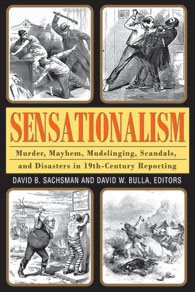The associate professor in the School of Communications examines the impact of political cartooning as part of a multi-author book on media sensationalism in the 19th century.
Associate Professor Harlen Makemson’s chapter, “Anglophobia as Art: Free Trade and Protection in Grover Cleveland Political Cartoons,” is featured in the just-released Sensationalism: Murder, Mayhem, Mudslinging, Scandals, and Disasters in 19th-Century Reporting, edited by David B. Sachsman and David W. Bulla.
chapter, “Anglophobia as Art: Free Trade and Protection in Grover Cleveland Political Cartoons,” is featured in the just-released Sensationalism: Murder, Mayhem, Mudslinging, Scandals, and Disasters in 19th-Century Reporting, edited by David B. Sachsman and David W. Bulla.
In the chapter, Makemson analyzes cartoons during the 1884 presidential campaign and discovers that far from being solely focused on Grover Cleveland’s illegitimate child scandal, the comic discourse included debate over the protective tariff and often couched those arguments within fervent nationalism.
In reviewing the book, Professor Donald Shaw of the University of North Carolina wrote: “This book goes a long way in explaining why we publically scorn sensationalism while secretly sampling it. Apparently we always have. And the writing in the book, like the news stories studied, is so bright, it is almost . . . well, sensational.”


